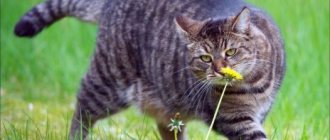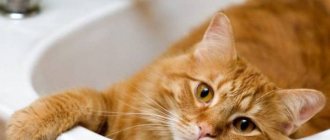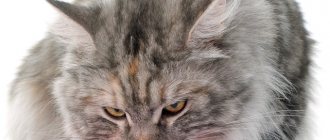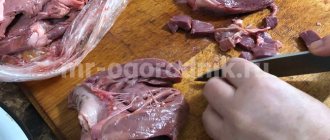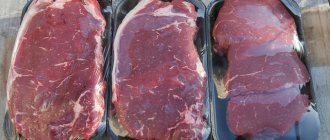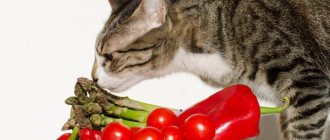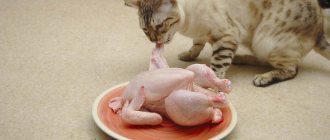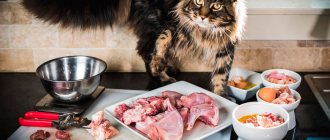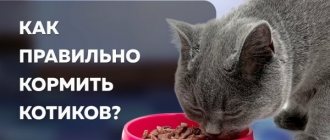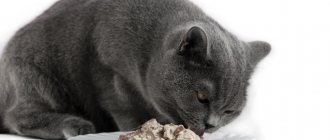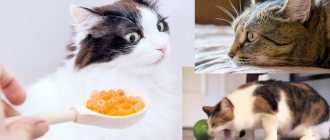When a cat is waiting for a replenishment, you need to try to do everything to make it more comfortable and calm for her to endure her position. Properly balanced food plays an important role for the full intrauterine development of future offspring. That is why a caring owner should know what to feed a pregnant cat, what can be given to her, and what is strictly prohibited. We will devote this article to this issue.
How many times a day can you feed a pregnant cat?
On average, pregnancy lasts about 63 days. This period is divided into three stages, and the nutrition of a pregnant cat at this time varies significantly:
- 7 – 21 days of pregnancy. At the very beginning of the term, the pet’s appetite increases, but this does not indicate the need for constant feeding of the animal. During this period, she should not eat more than 4 times a day. The total increase in feed weight does not exceed 20%. Particular attention should be paid to the British breed, as it has a tendency to become obese.
- 21 – 49 days of pregnancy. During this period, you can increase either the frequency of feedings or the weight of the portion. At this time, the increase in feed intake can be close to 50%.
- 49 – 63 days of pregnancy. This is the final stage of pregnancy, the animal usually feels somewhat worse, and there is a decrease in appetite. The babies become big and put pressure on the animal’s stomach. During this period, the number of feedings remains at the same level, and the portion weight decreases until the first stage of pregnancy.
Features of bearing kittens
An animal's need for energy, proteins, fats, carbohydrates, minerals and vitamins is largely determined by its lifestyle and physiological state. During gestation, significant physiological changes occur in the body, which increase the appetite of the four-legged friend. In a normal course, pregnancy in cats usually lasts 9 calendar weeks. Depending on the condition, the period may vary up or down by seven to fourteen days. During the gestation period, the appearance and behavioral habits change. The animal tries to spend as much time as possible alone, choosing secluded places. Activity noticeably decreases, sleep and rest time increases. A pet that gains weight over time loses its former activity and grace and becomes more clumsy. During such periods, you need to especially carefully monitor your physical condition to prevent damage and injury. Your pet's taste preferences and appetite may change. In one period it increases, in others it decreases. So, in the last few weeks, kittens rapidly developing in the stomach begin to put pressure on the internal organs of the mother’s body, as a result of which the appetite decreases. The pet may feel sick in the first two to three weeks after fertilization. This is a normal physiological process that is not considered a pathology and goes away after some time.
What can you feed a pregnant cat?
The question of what to feed a pregnant cat is best answered by a veterinarian. However, according to the recommendations, the following products must be included in the animal’s daily diet:
- An important and mandatory condition for the proper development of the offspring and the normal functioning of the organs of a pregnant cat is the presence of proteins. Moreover, proteins can be not only animal, but also plant origin. To get protein into the body, you can treat your pet to chicken, beef, and turkey. A prerequisite for a cat expecting offspring is meat with a reduced fat content.
- Feeding fermented milk products has a beneficial effect on the health of babies and their mothers. For mom, these products will help normalize digestion and retain the necessary calcium. This substance is also necessary for the formation of the skeleton in offspring.
- Your cat's diet should include vegetables every day. Of course, it would be better if the vegetables came to her boiled. But if the expectant mother does not eat them boiled, then you can grind them with meat.
- It is necessary to give your pet an egg yolk once a week.
- To obtain vitamin D, which is so necessary for a cat, you need to give it boiled cartilage.
- The Scottish cat is allowed to feed fish, and fatty fish such as trout and salmon will not harm this breed at all.
Problems after childbirth
Eclampsia is the most dangerous disease in cats after birth. This disease causes a sudden onset of calcium imbalance. Many veterinarians today have little understanding of the physiology and psychology of cats, so such a serious and dangerous disease as eclampsia is more often understood as the whim of a cat that has suffered stress. Very often, the first signs should be considered: dog breathing (frequent), restless behavior (may grab kittens and drag them from place to place). If you have any suspicions or even one alarming symptom, consult a doctor immediately! For eclampsia, there can be only one effective treatment - calcium gluconate injections. This drug can be given for prophylactic purposes (one ml per day). If these symptoms are observed, there will be little prevention. The initial dose for injection is 2.5 ml; if improvement does not occur within 30-40 minutes, the injection should be repeated. The maximum permissible dose is 10 ml, that is, four injections in three hours.
Minor bleeding can be another danger. Discharge after birth in cats stops within the first two days, but if more time has passed and the condition does not improve, be sure to show the animal to a specialist. Usually this condition indicates poor contraction of the uterus, and since the cervix remains slightly open after childbirth, the infection can easily enter and spread.
What products are prohibited?
You should not give your cat vegetables that cause stomach stagnation and intestinal fermentation, such as cabbage. If she suffers from constipation, then you should not feed her rice, which can be replaced with oatmeal.
It is not recommended to feed an animal with fish, because the enzymes present in it have a destructive effect on vitamin B, which is directly involved in the intrauterine formation of offspring. If the cat adores it and cannot do without it, then a piece of sea and low-fat, but always boiled fish, no more than once a week, will be enough for it.
A natural-fed cat needs to include vitamins and minerals in its diet, and they should be given to the animal only after consulting a veterinarian.
Feeding after childbirth
Cat birth is a lot of stress for the animal. Some cats refuse to eat for the first 24 hours, as they lick the kittens and eat the “leftovers.” After giving birth, the cat needs plenty of nutritious fluids. Such drinks can be warm milk and low-fat meat broths made from turkey, chicken and beef. During feeding, the animal usually experiences a severe calcium deficiency, which impairs the quality of the coat, causes twitching of the hind legs, but can also lead to death. To avoid this, you need to regularly see a specialist and do the necessary injections. From one to two months, kittens feed on their mother's milk, so they cannot be separated. Basically, the diet of a nursing cat is the same as that of a pregnant cat.
Can a pregnant cat be fed dry food?
This question very often interests the owners of the expectant mother. If the cat was dry-fed before pregnancy, then this period is not the best time to change its usual food. However, you should not feed her cheap food purchased in suspicious places. Specialized food is best for your pet, but not all manufacturers have a similar series. There is an opinion among veterinarians that kitten food can be given during this period, because it contains all the necessary substances for the development of the fetus.
When feeding using dry food, all food additives must be excluded from the diet, since an excess of microelements and vitamins is dangerous to the health of the animal.
What should you not give?
There are some cat owners who like to pamper their pets with tasty morsels from the common table: they may be very tasty, but they are not entirely healthy (in some cases, even for the person himself).
Therefore, all human nasty things are not given to a pregnant animal. This rule especially applies to:
- all types of cheap sausage, where the only meat present is “gulkin’s nose”;
- salted-smoked foods;
- everything that may contain “chemistry”.
Veterinarian advice
Veterinarians who monitor pregnant cats advise owners to include in the diet during the 2nd stage of pregnancy nettle leaves, previously scalded with boiling water and chopped as finely as possible. This remedy will help enhance the animal's lactation.
To prevent your pet from having a miscarriage and to make the birth process as easy as possible, you need to give her a decoction of raspberry leaves. To prepare the decoction, take 1 tablespoon of raspberry leaves per glass of boiling water. If you give your cat a decoction of 1 teaspoon 2 times a day, there is a chance to avoid a miscarriage.
When monitoring the nutrition of a pregnant cat, you need to exclude cheap food, treats and low-quality products from the diet. Not only the health of the future offspring, but also the condition of everyone’s favorite depends on the quality of the substances entering the pet’s body.
Educational program on some elements
Folic acid . At the beginning of pregnancy (about a couple of weeks after mating) and before conception (at least 3 months), it is a good idea to give your cat folic acid. This connection is actively involved:
- in DNA synthesis and cell division;
- formation of the blood system in future offspring;
- formation of the neural tube and brain of the embryo.
Calcium and phosphorus . Experts also give recommendations on the use of calcium in the diet. Usually it is included only in the second half of pregnancy (by the way, it lasts on average 65 days), and 3 weeks before birth it is excluded from the cat’s menu.
- Excess calcium will provoke the growth of the skull bones and a lag in the development of already born kittens.
- Lack of calcium is the cause of eclampsia in a woman in labor (the appearance of convulsions, fever and even death) and puerperal fever.
As for phosphorus, this element is found in abundance in meat, so when selecting vitamin and mineral supplements, make sure that it is not there. Otherwise, you can get an imbalance in calcium-phosphorus metabolism.
On a note! When using dry food, there is no need to introduce additional vitamins and minerals into the diet for pregnant cats, since everything is already balanced in it.
It is believed that when feeding naturally, additional calcium must be included in the diet to balance out phosphorus: 100 g of meat product should contain 150 mg of calcium. It is better to give it in its natural form, for example, by grinding eggshells into powder.
But trying to feed a pregnant cat with calcium gluconate is a waste of time, since calcium is absorbed by the body only from the carbonate compound. For better absorption of the mineral component, you can use fish oil.
Protein is necessary for the formation of all tissues and is involved in milk production during lactation. With a lack of protein, the animal loses muscle mass.
Taurine is an amino acid. With its deficiency, miscarriage or death of the offspring occurs in the middle of pregnancy, and the birth of underdeveloped and sick kittens is possible.
Fatty acids such as linoleic and arachidonic acids are also important in maintaining pregnancy. If they are deficient, unborn offspring may die, and in the future the cat will become infertile.
Copper and iron are elements that must be present in the diet to prevent the development of anemia, but their excess will lead to constipation.
False pregnancy
False pregnancy is a pathological condition of an animal in which it believes itself to be pregnant. In this case, all signs of pregnancy may appear, but the animal is not pregnant. The nipples swell, colostrum is released, behavior changes, and the cat may begin to build a nest.
This happens under the influence of the production of sex hormones. In advanced cases, an increased amount of colostrum can affect, for example, the formation of mastitis.
Any such condition is stressful for the animal and can ultimately lead to many pathologies, in addition to the reproductive system. And if you have not previously wanted to sterilize your cat, displays of false pregnancy one or more times should seriously make you think about it and carry out sterilization.
After all, in the future you can get diseases such as pyometra, ovarianitis, endometritis and breast cancer with the highest percentage.
Early neutering can prevent all of these pathologies if the cat never gives birth. Remember that every time a cat goes into heat, she experiences severe stress, which, in addition to wasting hormone production, triggers other pathological processes that affect health; giving hormonal medications is not a solution, but rather a worsening situation.
More than once, after the first administration of such drugs, doctors have already encountered pathologies such as total mastopathy and malignant neoplasms.
If this pathology is detected, it is important to consult a veterinarian for advice; he will tell you what medications should be given to reduce colostrum production and additional treatment, if necessary. On your part, it is necessary to limit the cat from stress and reduce fluid intake.
